formerly eScholarship Editions


|
|
|
|
Your search for
'Composers' in subject
found 15 book(s). | Modify Search | Displaying 1 - 15 of 15 book(s) | |
| 1. | 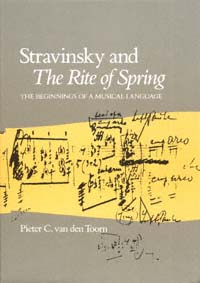 | Title: Stravinsky and the Rite of spring: the beginnings of a musical language Author: Van den Toorn, Pieter C 1938- Published: University of California Press, 1987 Subjects: Music | Composers Similar Items |
| 2. | 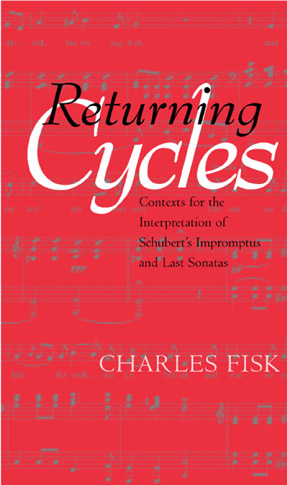 | Title: Returning cycles: contexts for the interpretation of Schubert's impromptus and last sonatas Author: Fisk, Charles Published: University of California Press, 2001 Subjects: Music | Musicology | Composers Publisher's Description: This compelling investigation of the later music of Franz Schubert explores the rich terrain of Schubert's impromptus and last piano sonatas. Drawing on the relationships between these pieces and Schubert's Winterreise song cycle, his earlier "Der Wanderer," the closely related "Unfinished" Symphony, and his story of exile and homecoming, "My Dream," Charles Fisk explains how Schubert's view of his own life may well have shaped his music in the years shortly before his death. Fisk's intimate portrayal of Schubert is based on evidence from the composer's own hand, both verbal (song texts and his written words) and musical (vocal and instrumental). Noting extraordinary aspects of tonality, structure, and gestural content, Fisk argues that through his music Schubert sought to alleviate his apparent sense of exile and his anticipation of early death. Fisk supports this view through close analyses of the cyclic connections within and between the works he explores, finding in them complex musical narratives that attempt to come to terms with mortality, alienation, hope, and desire. Fisk's knowledge of Schubert's life and music, together with his astute and imaginative attention to musical detail, helps him achieve one of the most difficult goals in music criticism: to capture and verbalize the human content of instrumental music. [brief] Similar Items |
| 3. | 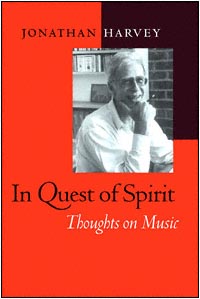 | Title: In quest of spirit: thoughts on music Author: Harvey, Jonathan 1939- Published: University of California Press, 1999 Subjects: Music | Composers | Contemporary Music | Religion Publisher's Description: The interests of the British composer Jonathan Harvey are wide and varied, embracing Christianity, Buddhism, eastern and western philosophy, aesthetics, science, and mysticism. All affect his musical thinking and are a part of this unusual and personal book, which is accompanied by a compact disc featuring works discussed by the author.Harvey explores aspects of music that he connects with spirituality: self-identity, ambiguity, unity, stasis, and silence. In the course of his explorations he offers corroborating statements about music and spirituality from sources ranging from Nietzsche to Oliver Sacks. The book and CD include samples of his own music as well as compositions by Mozart, Scriabin, Stockhausen, and others that help to illustrate the profoundness of what Harvey deems "the good listening experience."For Harvey, composing is his way of trying to live a life "skillfully" in the Buddhist sense. In Quest of Spirit is a window into his creative world and provides a sense of what music can mean at the moment of its inception. [brief] Similar Items |
| 4. | 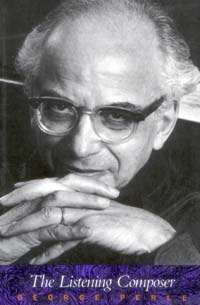 | Title: The listening composer Author: Perle, George 1915- Published: University of California Press, 1990 Subjects: Music | Contemporary Music | Composers Publisher's Description: George Perle takes us into the composer's workshop as he reevaluates what we call "twentieth-century music" - a term used to refer to new or modern or contemporary music that represents a radical break from the tonal tradition, or "common practice," of the preceding three centuries. He proposes that this music, in the course of breaking with the tonal tradition, presents coherent and definable elements of a new tradition. In spite of the disparity in their styles, idioms, and compositional methods, he argues, what unites Scriabin, Stravinsky, Bartók, and the Viennese circle (Schoenberg, Berg, and Webern) is more important than what separates them.If we are to understand the connections among these mainstream composers, we also have to understand their connections with the past. Through an extraordinarily comprehensive analysis of a single piece by Varèse, Density 21.5 for unaccompanied flute, Perle shows how these composers refer not only to their contemporaries but also to Wagner, Debussy, and Beethoven.Perle isolates the years 1909-10 as the moment of revolutionary transformation in the foundational premises of our musical language. He asks: What are the implications of this revolution, not only for the composer, but also for the listener? What are the consequences for the theory and teaching of music today? In his highly original answers, Perle relates the role of intuition in the listening experience to its role in the compositional process.Perle asserts that the post-Schoenbergian serialists have preoccupied themselves with secondary and superficial aspects of Schoenberg's twelve-tone method that have led it to a dead end but he also exposes the speciousness of current alternatives such as chance music, minimalism, and the so-called return to tonality. He offers a new and more comprehensive definition of "twelve-tone music" and firmly rejects the notion that accessibility to the new music is reserved for a special class of elite listeners. [brief] Similar Items |
| 5. | 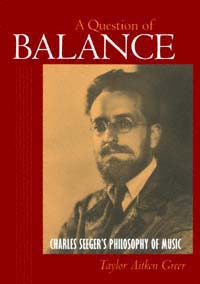 | Title: A question of balance: Charles Seeger's philosophy of music Author: Greer, Taylor Aitken 1955- Published: University of California Press, 1998 Subjects: Music | Ethnomusicology | Musicology | Composers Publisher's Description: One of this century's most influential musical intellects takes center stage in Taylor Greer's meticulously wrought study of Charles Seeger (1886-1979). Seeger left an indelible mark in the fields of musicology, music criticism, ethnomusicology, and avant-garde musical composition, but until now there has been no extended appreciation and critique of Seeger's work as a whole, nor has an accessible guide to his texts been available.Exploring the entire corpus of Charles Seeger's writing, A Question of Balance highlights the work of those persons who most influenced him, especially Henri Bergson, Bertrand Russell, and Ralph Perry. Invited to inaugurate the music department at the University of California's Berkeley campus in 1912, Seeger became keenly aware of his deficiencies in general education and put himself on a rigorous regimen of intellectual development that included studying history, anthropology, political theory, and philosophy. For the remainder of his life his ideas about music heavily influenced the development of ethnomusicology and systematic musicology.Charles Seeger is perhaps best known as the father of the folk singers Pete, Mike, and Peggy Seeger and as the husband of the innovative American composer Ruth Crawford. This book makes clear that Seeger was an extremely important thinker and educator in his own right. Seeger's intellectual curiosity was as eclectic as it was enthusiastic, and Greer skillfully weaves together the connections Seeger made between music, the humanities, and the sciences. The result is a luminous tapestry depicting Seeger's ideal schemes of musicology. At the same time it reflects the turbulence and vitality in American musical life during the early decades of the century. [brief] Similar Items |
| 6. | 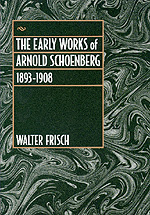 | Title: The early works of Arnold Schoenberg, 1893-1908 Author: Frisch, Walter Published: University of California Press, 1997 Subjects: Music | Composers | Contemporary Music | Musicology Publisher's Description: Here is the first full-scale account of Schoenberg's early tonal works, a rich repertory that music historians have tended to neglect or view as transitional to a mature atonal style.Between 1893 and 1908, Schoenberg created many genuine masterworks in the genres of Lieder, chamber music, and symphonic music. This book includes detailed critical analyses of such widely admired and performed compositions as Verklärte Nacht , Gurrelieder , and the First Chamber Symphony, as well as discussions of little-known but important songs and instrumental works from the earlier years.Drawing on original manuscript sources, on Schoenberg's musical environment, on a range of analytical methods, and on Schoenberg's own theories, Frisch traces the development of technique and aesthetic across this critical fifteen-year period of the composer's career. [brief] Similar Items |
| 7. | 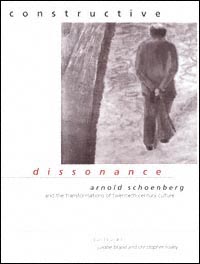 | Title: Constructive dissonance: Arnold Schoenberg and the transformations of twentieth-century culture Author: Brand, Juliane Published: University of California Press, 1997 Subjects: Music | Musicology | Composers | Intellectual History | Art History Publisher's Description: Arnold Schoenberg (1874-1951) is a pivotal figure of musical modernism. The "father of serialism" has influenced nearly every major composer of this century, and the idea of Schoenberg, now wild-eyed radical, now embattled moralist, now lonely prophet, is woven into the mythos of modern art. What is more, the sites of his professional activity - fin de siècle Vienna, the Berlin of the Weimar Republic, and his "exile to paradise" in Los Angeles - bring home the representative quality of his life and works, which bear witness to some of the defining experiences of our time.This collection by leading Schoenberg scholars is an interdisciplinary examination of the historical, aesthetic, and intellectual issues that formed Schoenberg's creative persona and continue to influence our response to the modernist legacy of the first half of this century. The book's first section, "Contexts," investigates Schoenberg's sense of ethnic, religious, and cultural identity. The second section, "Creations," focuses on specific works and the interplay between creative impulse and aesthetic articulation. The final section, "Connections," addresses the relationship of Schoenberg's legacy to present-day thought and practice. [brief] Similar Items |
| 8. | 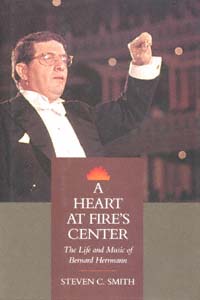 | Title: A heart at fire's center: the life and music of Bernard Herrmann Author: Smith, Steven C Published: University of California Press, 1991 Subjects: Cinema and Performance Arts | Film | Contemporary Music | Composers Publisher's Description: No composer contributed more to film than Bernard Herrmann, who in over 40 scores enriched the work of such directors as Orson Welles, Alfred Hitchcock, François Truffaut, and Martin Scorsese. In this first major biography of the composer, Steven C. Smith explores the interrelationships between Herrmann's music and his turbulent personal life, using much previously unpublished information to illustrate Herrmann's often outrageous behavior, his working methods, and why his music has had such lasting impact.From his first film ( Citizen Kane ) to his last ( Taxi Driver ), Herrmann was a master of evoking psychological nuance and dramatic tension through music, often using unheard-of instrumental combinations to suit the dramatic needs of a film. His scores are among the most distinguished ever written, ranging from the fantastic ( Fahrenheit 451 , The Day the Earth Stood Still ) to the romantic ( Obsession , The Ghost and Mrs. Muir ) to the terrifying ( Psycho ).Film was not the only medium in which Herrmann made a powerful mark. His radio broadcasts included Orson Welles's Mercury Theatre of the Air and The War of the Worlds . His concert music was commissioned and performed by the New York Philharmonic, and he was chief conductor of the CBS Symphony.Almost as celebrated as these achievements are the enduring legends of Herrmann's combativeness and volatility. Smith separates myth from fact and draws upon heretofore unpublished material to illuminate Herrmann's life and influence. Herrmann remains as complex as any character in the films he scored - a creative genius, an indefatigable musicologist, an explosive bully, a generous and compassionate man who desperately sought friendship and love. [brief] Similar Items |
| 9. | 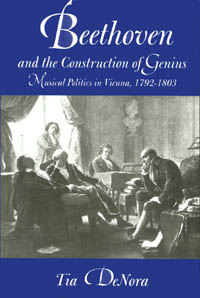 | Title: Beethoven and the construction of genius: musical politics in Vienna, 1792-1803 Author: DeNora, Tia 1958- Published: University of California Press, 1996 Subjects: Music | History | Sociology | Composers | European History Publisher's Description: In this provocative account Tia DeNora reconceptualizes the notion of genius by placing the life and career of Ludwig van Beethoven in its social context. She explores the changing musical world of late eighteenth-century Vienna and follows the activities of the small circle of aristocratic patrons who paved the way for the composer's success.DeNora reconstructs the development of Beethoven's reputation as she recreates Vienna's robust musical scene through contemporary accounts, letters, magazines, and myths - a colorful picture of changing times. She explores the ways Beethoven was seen by his contemporaries and the image crafted by his supporters. Comparing Beethoven to contemporary rivals now largely forgotten, DeNora reveals a figure musically innovative and complex, as well as a keen self-promoter who adroitly managed his own celebrity.DeNora contends that the recognition Beethoven received was as much a social achievement as it was the result of his personal gifts. In contemplating the political and social implications of culture, DeNora casts many aspects of Beethoven's biography in a new and different light, enriching our understanding of his success as a performer and composer. [brief] Similar Items |
| 10. | 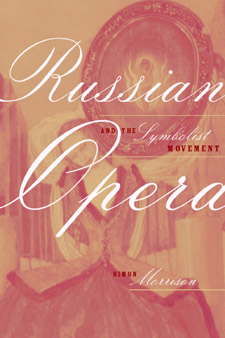 | Title: Russian opera and the symbolist movement Author: Morrison, Simon Alexander 1964- Published: University of California Press, 2002 Subjects: Music | Opera | Musicology | Composers | Russian and Eastern European Studies | Literature Publisher's Description: An aesthetic, historical, and theoretical study of four scores, Russian Opera and the Symbolist Movement is a groundbreaking and imaginative treatment of the important yet neglected topic of Russian opera in the Silver Age. Spanning the gap between the supernatural Russian music of the nineteenth century and the compositions of Prokofiev and Stravinsky, this exceptionally insightful and well-researched book explores how Russian symbolist poets interpreted opera and prompted operatic innovation. Simon Morrison shows how these works, though stylistically and technically different, reveal the extent to which the operatic representation of the miraculous can be translated into its enactment. Morrison treats these largely unstudied pieces by canonical composers: Tchaikovsky's Queen of Spades, Rimsky-Korsakov's Legend of the Invisible City of Kitezh and the Maiden Fevroniya, Scriabin's unfinished Mysterium, and Prokofiev's Fiery Angel. The chapters, revisionist studies of these composers and scores, address separate aspects of Symbolist poetics, discussing such topics as literary and musical decadence, pagan-Christian syncretism, theurgy, and life creation, or the portrayal of art in life. The appendix offers the first complete English-language translation of Scriabin's libretto for the Preparatory Act. Providing valuable insight into both the Symbolist enterprise and Russian musicology, this book casts new light on opera's evolving, ambiguous place in fin de siècle culture. [brief] Similar Items |
| 11. | 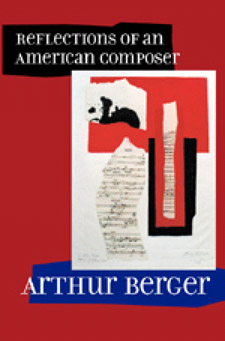 | Title: Reflections of an American composer Author: Berger, Arthur 1912- Published: University of California Press, 2002 Subjects: Music | American Music | Classical Music | Contemporary Music | Composers | Musicology Publisher's Description: In this engrossing collection of essays, distinguished composer, theorist, journalist, and educator Arthur Berger invites us into the vibrant and ever-changing American music scene that has been his home for most of the twentieth century. Witty, urbane, and always entertaining, Berger describes the music scene in New York and Boston since the 1930s, discussing the heady days when he was a member of a tight-knit circle of avant-garde young composers mentored by Aaron Copland as well as his participation in a group at Harvard University dedicated to Stravinsky. As Virgil Thomson's associate on the New York Herald Tribune and founding editor of the prestigious Perspectives of New Music, Berger became one of the preeminent observers and critics of American music. His reflections on the role of music in contemporary life, his journalism career, and how changes in academia influence the composition and teaching of music offer a unique perspective informed by Berger's abundant intelligence and experience. [brief] Similar Items |
| 12. | 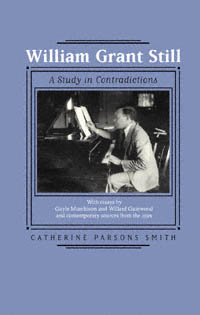 | Title: William Grant Still: a study in contradictions Author: Smith, Catherine Parsons 1933- Published: University of California Press, 2000 Subjects: Music | Composers | African American Studies | Autobiographies and Biographies Publisher's Description: During the 1930s and 1940s William Grant Still (1895-1978) was known as the "Dean of Afro-American Composers." He worked as an arranger for early radio, on Broadway, and in Hollywood; major symphony orchestras performed his concert works; and an opera, written in collaboration with Langston Hughes, was produced by the New York City Opera. Despite these successes the composer's name gradually faded into obscurity. This book brings William Grant Still out of the archives and examines his place in America's musical heritage. It also provides a revealing window into our recent cultural past.Until now Still's profound musical creativity and cultural awareness have been obscured by the controversies that dogged much of his personal and professional life. New topics explored by Catherine Parsons Smith and her contributors include the genesis of the Afro American Symphony , Still's best-known work; his troubled years in film and opera; and his outspoken anticommunism. [brief] Similar Items |
| 13. | 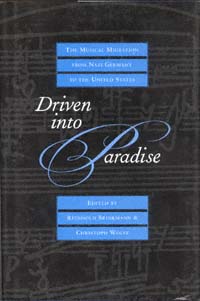 | Title: Driven into paradise: the musical migration from Nazi Germany to the United States Author: Brinkmann, Reinhold 1934- Published: University of California Press, 1999 Subjects: Music | American Music | Composers | Musicology | European History | United States History Publisher's Description: The forced migration of artists and scholars from Nazi Germany is a compelling and often wrenching story. The story is twofold, of impoverishment for the countries the musicians left behind and enrichment for the United States. The latter is the focus of this eminent collection, which approaches the subject from diverse perspectives, including documentary-style newspaper accounts and an exploration of Walt Whitman's poetry in the work of Paul Hindemith and Kurt Weill.The flood of musical migration from Germany and Austria from 1933 to 1944 had a lasting impact. Hundreds of musicians and musicologists came to the United States and remained here, and the shaping power of their talents is incalculable. Several essays provide firsthand insights into aspects of American cultural history to which these émigrés made essential contributions as conductors, professors, and composers; other essays tell of the traumatic experience of being exiled and the difficulties of finding one's way in a foreign country. While the migration infused the U.S. with a distinctly European musical awareness, at the same time the status and authority of its participants tended to intervene in the development of a genuinely American cultural voice. The story of the unprecedented migration that resulted from Nazism has many dimensions, and Driven Into Paradise illuminates them in deeply human terms. [brief] Similar Items |
| 14. | 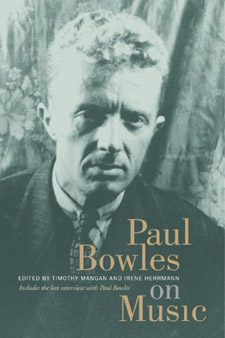 | Title: Paul Bowles on music Author: Bowles, Paul 1910- Published: University of California Press, 2003 Subjects: Music | American Music | Composers | Contemporary Music | American Literature | Film Publisher's Description: "It's an easy enough job if one has something to say," Paul Bowles remarked in a letter to his mother about his first foray into music criticism. And Paul Bowles, indeed, had plenty to say about music. Though known chiefly as a writer of novels and stories, Paul Bowles (1910-99) thought of himself first and foremost as a composer. Drawing together the work he did at the intersection of his two passions and professions, writing and music, this volume collects the music criticism Bowles published between 1935 and 1946 as well as an interview conducted by Irene Herrmann shortly before his death. An intimate of Aaron Copland and protégé of Virgil Thomson, Bowles was a musical sophisticate acquainted with an enormous range of music. His criticism collected here brilliantly illuminates not only the whole range of modernist composition but also film music, jazz, Mexican and Moroccan music, and many other genres. As a reviewer he reports on established artists and young hopefuls, symphonic concerts indoors and out, and important premieres of works by Copland, Thomson, Cage, Shostakovich, and Stravinsky, among others. Written with the austere grace of his better-known literary works, Bowles's criticism enhances our picture of an important era in American music history as well as our sense of his accomplishments and extraordinary contribution to twentieth-century culture. [brief] Similar Items |
| 15. | 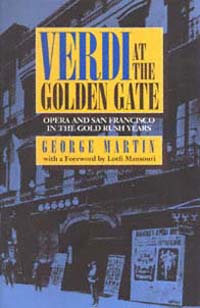 | Title: Verdi at the Golden Gate: opera and San Francisco in the Gold Rush years Author: Martin, George Whitney Published: University of California Press, 1993 Subjects: Music | History | Opera | Composers | American Studies | California and the West | European History Publisher's Description: Opera is a fragile, complex art, but it flourished extravagantly in San Francisco during the Gold Rush years, a time when daily life in the city was filled with gambling, duels, murder, and suicide. In the history of the United States there has never been a rougher town than Gold Rush San Francisco, yet there has never been a greater frenzy for opera than developed there in these exciting years.How did this madness for opera take root and grow? Why did the audience's generally drunken, brawling behavior gradually improve? How and why did Verdi emerge as the city's favorite composer? These are the intriguing themes of George Martin's enlightening and wonderfully entertaining story. Among the incidents recounted are the fist fight that stopped an opera performance and ended in a fatal duel; and the brothel madam who, by sitting in the wrong row of a theater, caused a fracas that resulted in the formation of the Vigilantes of 1856.Martin weaves together meticulously gathered social, political, and musical facts to create this lively cultural history. His study contributes to a new understanding of urban culture in the Jacksonian?Manifest Destiny eras, and of the role of opera in cities during this time, especially in the American West. Over it all soars Verdi's somber, romantic music, capturing the melancholy, the feverish joy, and the idealism of his listeners. [brief] Similar Items |